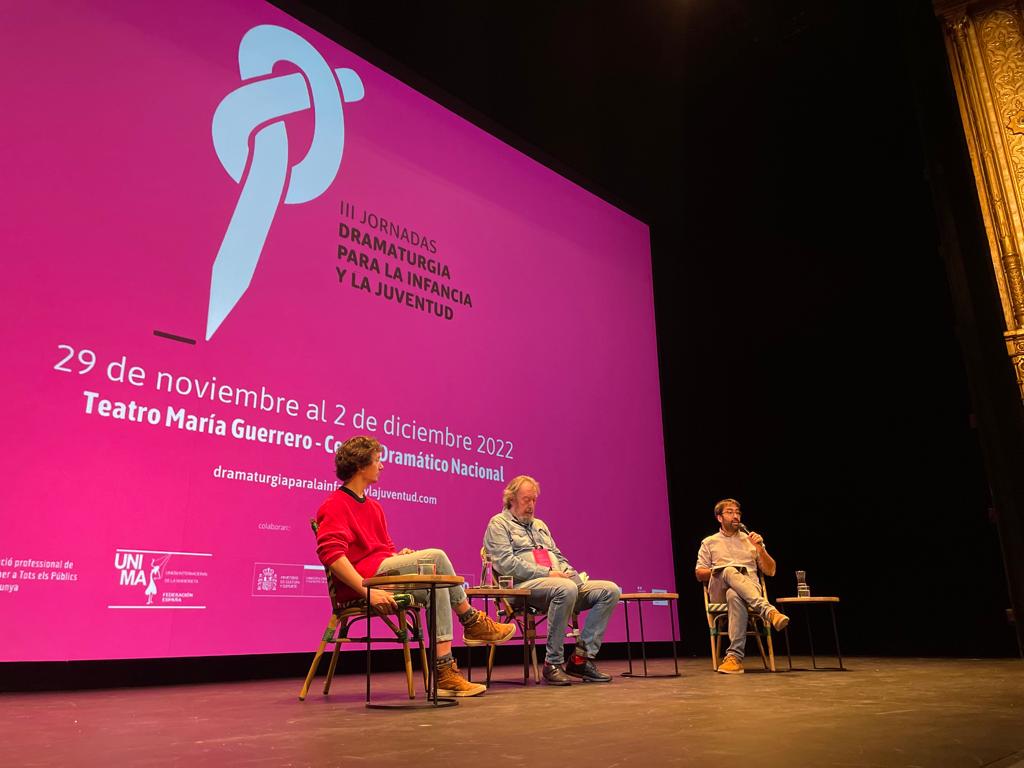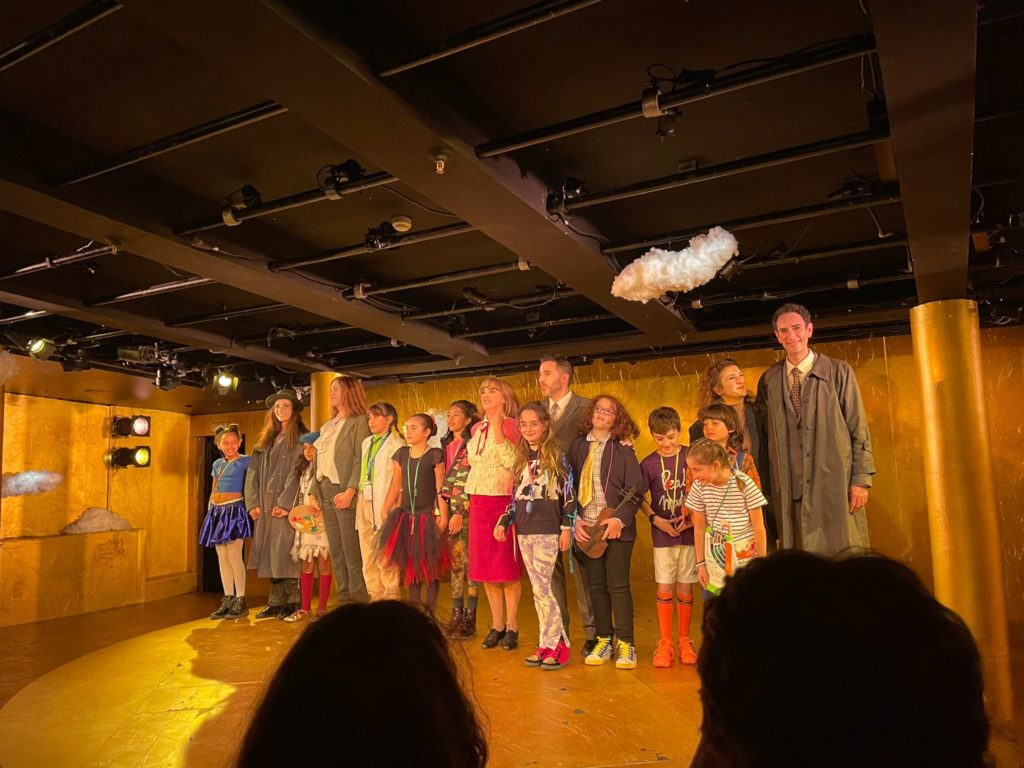The 3rd Conference on Drama for Children and Youth is established as a reference space to defend children's right of access to art

He National Drama Centre of Madrid hosted the celebration of the Third edition of the Days of Drama for Children and Youth. A quote that represents the consolidation of this competition as a reference space to defend the right of access to art for children and youth and their importance as an audience in need of high-quality artistic proposals.
The Conferences, Organized jointly by three entities: ASSITEJ Spain, Unima and the TTP, offered a ambitious program that aimed to deepen the fundamentals of dramaturgy for young people, girls and boys.
The final result has been Four days of conferences and workshops with specialists and professionals from the sector who have created spaces for debate, analysis and reflection with a single primary mission: to place the figure of children and young people at the centre.
Taller de escritura teatral con Blanca Felipe Rivero
Blanca Felipe Rivero, originally from Havana, is a playwright and screenwriter. Author of Romeo and Juliana -among many others-, “a guajira version of Romeo and Juliet” As she herself indicates, the author repeatedly asks herself whether What we know or what we are looking for is more important and ensures that “sharing is a great source of learning.”
Within the framework of the conferences, the workshop was offered“I am” of the character and the mother image in writing explorations for childhood. A space where work was done from the exploration and it became clear that the most important thing in the text is the character and the most important thing about the scene, the actor. At the same time it was claimed that It's not all about making great texts, since sometimes the most mundane things can become the greatest.
Starting from the question, Where do we write from?, we tried to give voice and presence to childhood in writing exercises based on the random chains of actions and sensory explorations.
Testimonies of the participants After finishing the workshop, they leave without a doubt that it has been a very enriching experience:
“It has been an eye-opening experience, especially being able to see the diverse creative processes of each one,” Lucia commented.
“Blanca has a great passion for pushing” Mercedes explained excitedly “Thank you for this trip.”
“It has been a very interesting and exciting process. I only have words of gratitude. How nice it is to write in company and with honesty!” Txema pointed out.
“We have shared many emotions” Nieves sentenced. “Blanca cares for and cherishes the word, she has come with simplicity and humility. We have discovered that we are not who we thought we were. Thank you for helping me to know who I am.”

Taller el objeto en escena y su esencia dramática
With the help of TOPIC, the Tolosa International Puppet Centre, Juanjo Herrero led this practical proposal for professionals belonging to various areas of the Performing Arts, delving into the dramaturgy of Object and Puppet Theatre. A space that aimed to analyze and put into practice different examples of professional companies that use various manipulation techniques to construct new forms of theatrical and visual dramaturgy. The work was done puppet manipulation as well as the manipulation of objects, paying special attention to the body, the arrangement of the puppet/object and the relationship of both in the scene.
“We have reflected on the value and possibilities of the object. Guided by Juanjo and Estitxu, a heterogeneous group of students from the most diverse performing arts disciplines, we have discovered a whole world hidden behind the object. The work has been intense, very practical and enriching and I think that all the participants have left with an immense number of concepts, ideas and questions that we can incorporate into our creative universe.” said Joan Alfred, one of the workshop participants.

Roundtables for debate and reflection
La dramaturgia para la infancia y la juventud
With the participation of Itziar Pascual, Luis Fernando de Julián, Nieves Rodríguez and Carlos Labraña This was a space for dialogue that revolved around the strategies for thinking about the future of drama for children and youth.
During the discussion table it became evident that there is a basic problem, a radical deficit of access to culture for children that needs to be eradicated, generating collaborative spaces and synergy. Likewise, different ideas were also shared, among which we can find the need to understand the theatre as a tool to generate community, the vindication of the theatrical book as a manifesto of democratic culture or the defence of the right to feel.

Adultocentrismo y educación en valores.
Censorship, self-censorship and taboos in drama for children and youth
Jose Luis Arellano, Jordi Palet, Ramon Molins, The Patio Theatre and Jose Troncoso were the speakers at this panel that reflected on the what authors look for when they want to address this audience and what the audience expects when they approach a play that is supposedly aimed at their age.
“I don’t put on shows for children to understand, but for them to enjoy”, “Many times we get to the end and the first and most important thing is that what we are talking about matters to us, and then that you bring a large dose of honesty to it” or the vindication of the need for generational closeness were some of the ideas that were shared during the conversation.

Otras textualidades para la infancia y la juventud: Dramaturgia masmedia; radio teatro; nuevos lenguajes tecnológicos, etc.
Lorenzo Soto and Raul Guirdi They shared this discussion table where they talked about the creative process for a young audience, highlighting the concept of creativity and showing that for a work of art to have meaning, it must always contain truth.
During the dialogue some ideas of concepts such as entertainment and immediacy: “When I talk to teenagers, I see that entertainment for them means finding something that doesn't make them think, my generation wasn't like that.”. “Young people are used to immediacy, attention is biased, if you don't divide up what you are offering them, continuity is complicated for them,” Guirdi stated.

La edición y la difusión de la dramaturgia para la infancia y la juventud. Traducción, difusión y comercialización
Carlos Gil, Daniel Ramirez and Gonzalo Moreno participated in this discussion panel where they presented different editorial projects and they were shared dissemination strategies, possibilities for internationalization, collaboration and exchange. The discussion focused on the evolution of children's theatre and on the natural tendency of boys and girls to interpret and create stories.
Among the projects presented, the following stands out: “Theatrical Context” an initiative to disseminate and make visible the arts of now, “Artezblai” the newspaper of the Performing Arts and the “Yorick Bookstore” specialized in performing arts with books on theater and dance, among others.

La dramaturgia para infancia y juventud en el ámbito internacional
On this occasion the discussion table had the participation of Sophie Merceron, France, Blanca Felipe, Cuba, Lucía de la Maza, Chile, and Lola Fernández, Madrid, who took a closer look at international dramaturgy by describing the situation in their respective countries of origin.
We discovered that the cuban theater It is very artisanal “it has that taste of closeness” Blanca explained that In France, youth theatre is present in theatres, but it still has problems entering large venues” Sophie shared and that In Chile, “theater for children and youth has made its way, but plays travel a lot outside the country“Internationalization has grown a lot,” said Lucía.

La literatura teatral en las distintas lenguas y territorios del estado
Sonia Alejo, Paula Carballeira, Aizpea Goenaga, Sílvia Navarro and Abigail Ballester discussed creation in different languages, coordination and promotion and dissemination policies. During the course of the discussion table, a plan was developed map of dramatic creation for children and youth in Spain and different ideas were put on the table such as “Let language not be an obstacle, but rather an added enrichment” or what "The precarious nature of companies means that they cannot rely on a professional translator."
During the conversation it was also claimed that recognize “the enjoyment of reading theater” and the task of translation was discussed in depth: “The work of translation is to go through the work again, to make sure it has the same rhythms, the same nuances.”

Conference
El reto de la escritura desde la práctica artística de múltiples espacios legitimados o no del teatro para y con niños en Cuba
White Philip has focused on the experience of writing from the stage, from the everyday core of artistic practice in professional and amateur groups, together with teaching work: working with students, actors, puppeteers, art instructors, children and other tasks on stage. Also, feedback from audiences, the exercise of judgment and work as a playwright.
Defining herself as a “creative subject” White, who has always been linked to cultural associations, shared in this conference that her experience as a playwright has led her to understand that not everything works for everyone, but there is a great importance of the contexts. The playwright also wanted to point out that "we have a pending task on audience perception” and has shown its immense gratitude because through her work she has the opportunity to tell the boys and girls “I believe in you.”

XXIII SGAE Children's Theater Award 2022
Within the framework of the Conference, the awarding of the XXIII SGAE Children's Theater Award 2022 for Mambrú returned from war, a work by the Galician playwright Carlos Labraña Barrero (Cedeira-A Coruña, 1969). Who addressed the audience to share that “I write in Galician and the fact that the prize was awarded in Galician for the first time, I think, is extremely important for normalisation and coexistence.” Labraña also thanked the holding of the Conference “It is a great way to connect all of us who are linked to this field.”

Project presentation
The Conference included a exhibition and exchange space where different people shared their latest projects. Among the projects presented, the following stand out: “Pepito (a life story for children and grandparents)”, “INVENT, INVENTORY, INVENTURE”, “One day I was a watermelon” and “White Paradise”.

Show
Los columpios
Los columpios It is the result of a process of listening, games and interviews with new dramatists who are, without a doubt, the future. Written and directed by José Troncoso “Los columpios” is a show that takes the audience to the last day of school where the “future elders” They are preparing to sing in front of their families to bid farewell to the school year, accompanied by Miss Mariví.









